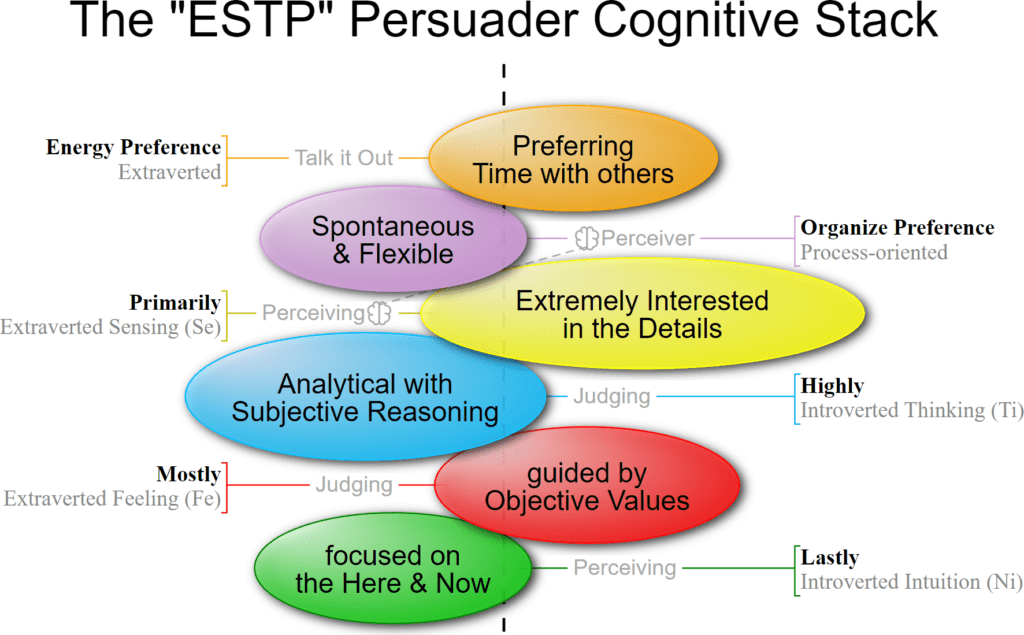What is the MBTI ESTP “Persuader” Personality Type?

People with ESTP personality types are frequently described as outgoing, action-oriented, and dramatic.
Persuaders enjoy spending time with a wide circle of friends and acquaintances.
Persuaders don’t like to be pinned down by excessive planning. Instead, they want to improvise and keep their options open.
With Extraverted Thinking as the dominant function, Persuaders are Perceivers who are highly interested in details and like to gather facts.
With Introverted Thinking as their top extraverted function, Persuaders use personal subjective reasons when making decisions.

Persuaders are guided by objective values with their Extraverted Feelings and focus more on the here and now instead of taking a broader view of things, with Introverted Intuition as their lowest function.
Persuaders are extraverted, preferring time with others to discuss things. They are process-oriented, spontaneous, and flexible.
Persuaders are “Concrete Perceivers” with Introverted Thinking and Extraverted Sensing. When feeling threatened, they speak in a dry, emotionally detached way; they are more practical, referring to specific details and issues. They may also behave with the Computer Satir Communication Style.
ESTP Personality Type cross-reference
- Keirsey Type – Promoter
- Temperament Type – Sanguine
- Animal Type – Golden Retriever
- DISC Type – Steadiness
- Socio-Communicative Type – Amiable
- True Colors – Orange
- Color Code – Yellow
- Personality Compass – South
- Occupational Type – Conventional
- Learning Type – Reflector
- Leadership Type – Accommodator
Enneagram Types
The Enneagram is a Personality Typing System comprising nine different types.

Dominant Function – Extraverted Sensing
- They tend to be realists because they focus on the present world.
- They are interested in the sights, sounds, and experiences immediately around them and have little use for daydreams or flights of fancy.
- As sensors, people with this personality type want to touch, feel, hear, taste, and see anything and everything that interests them.
- When learning about something new, it’s not enough to read about it in a textbook or listen to a lecture – they want to experience it for themselves.
- They also have lots of energy, so they can become bored in tedious or learning situations that involve a great deal of theoretical information.
- They are the quintessential “doers” – they get straight to work.
- They are willing to take risks to get the job done.
Auxiliary Function – Introverted Thinking
- When making judgments about the world, they focus inwardly, processing information logically and rationally.
- Because this side of personality is introverted, it is something that people may not immediately notice.
- This inner sense of control gives them a great deal of self-discipline.
- They are skilled at working independently and can be very goal-directed when they want to achieve an objective.
- They have excellent observational skills, noticing things others may overlook.
- As they take in information, they apply their sense of logic to look for practical and immediately applicable solutions.
Tertiary Function – Extraverted Feeling
- This function focuses on creating social harmony and relationships with others.
- While emotions are not an ESTP’s strongest suit, they greatly need social engagement.
- They enjoy being at the center of attention and are good at establishing a friendly rapport with other people.
- While social, they are sometimes less comfortable sharing their opinions and judgments with others.
- Rather than rock the boat, they focus more on pleasing others and maintaining harmony.
- They may sometimes overlook their needs to ensure that other people are happy.
Inferior Function – Introverted Intuition
- This aspect of personality focuses on analyzing information to identify patterns and develop a “gut feeling” about situations.
- This aspect of personality allows them to gain impressions of incoming data and create a sense of the future.
- They may look for connections that will allow them to understand what to expect will happen next.
- Intuition is not an ESTP strong suit, but they will sometimes develop strong gut reactions to a situation that may be completely inaccurate.
- Because of this, they may feel that they do not have good instincts.
ESTP Traits
ESTPs are “doers,” pragmatic, and spontaneous. They can be insensitive to others’ feelings, but this is because of their drive to get things done.
Other people sometimes describe them as “fast-talkers” who are highly persuasive. They often seem to be a few steps ahead of the conversation in social settings.
The primary function of an ESTP is Extraverted Sensing, in which they take in the world through their senses and view it concretely.
Their auxiliary function is Introverted Thinking, in which they can categorize and apply data.
They are abundantly enthusiastic and can quickly motivate those around them to work. They often have the confidence to start projects but lose interest before they are completed.
When confronted with problems, ESTPs quickly look at the facts and devise an immediate solution. They tend to improvise rather than spend much time planning.
ESTPs don’t have a lot of use for abstract theories or concepts and will place limited importance then, preferring to focus on what needs to be done.
They are very observant, often picking up on details others never notice.
ESTPs are direct risk-takers and have little tolerance for those who hold them back from their goals. This leap-before-they-look attitude can be problematic at times.
Strengths
- Gregarious, funny, and energetic
- Influential and persuasive
- Action-oriented
- Adaptable and resourceful
- Observant
Weaknesses
- Impulsive
- Competitive
- Dramatic at times
- Easily bored
- Insensitive
ESTP Relationships
Friendships
- They have an inexhaustible thirst for adventure.
- You can be a good friend by always being ready to head out for a new experience or creating exciting, novelty, and challenging plans.
Personal Relationships
- As extraverts, they gain energy from being around other people.
- People with this personality type are seen as fun, friendly, and charming in social settings.
- According to Keirsey, people with this personality type are exceptionally skilled at influencing people.
- They are great at interacting with other people and have a natural ability to perceive and interpret nonverbal communication.
- Thanks to these abilities, they tend to do very well in sales and marketing careers.
Partner Relationships
- ESTPs are exciting and fun-loving.
- Still, they can grow bored with routines.
- They do not enjoy long, philosophical discussions but like to keep the conversation flowing as they talk about shared interests and passions.
- They prefer to take things day by day and may struggle with making long-term commitments.
Parenting
- ESTP children can be adventurous and independent, so parents must set boundaries and ensure that fair, consistent discipline is used.
- Kids with this personality type need lots of hands-on activities to keep them busy.
- Still, they may struggle in classroom settings where they quickly grow weary of routines.
ESTP Careers
- People with an ESTP personality type feel energized when interacting with a wide variety of people, so they do best in jobs that involve working with others.
- They strongly dislike routine and monotony, so fast-paced jobs are ideal.
- ESTPs have several personality characteristics that make them well-suited for specific careers.
- As mentioned previously, ESPTs make great salespeople because they are so observant and have such strong people skills.
- Because they are action-oriented and resourceful, they are excellent in first-responder positions that require fast thinking and quick responses, such as emergency medical personnel and police officers.


